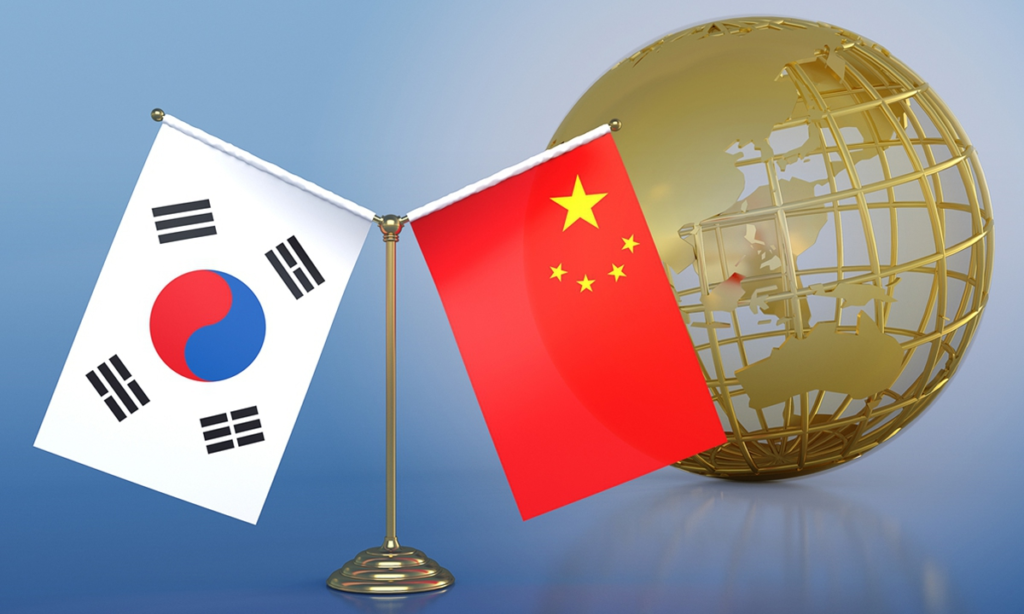The trade relationship between China and South Korea is robust, with a significant volume of goods being shipped between the two countries. Understanding the various shipping methods, associated costs, transit times, and necessary documentation is crucial for businesses and individuals involved in this international trade. This article will provide a detailed overview of shipping from China to South Korea, covering all aspects from shipping methods to customs clearance and tax policies.

Shipping Methods from China t Korea
Sea Freight from China to Korea
Sea freight is a commonly used method for transporting goods between China and South Korea due to its cost-effectiveness, especially for large shipments. It offers a reliable way to move a substantial volume of cargo across the sea.

Less than Container Shipping (LCL) from China to Korea
Less than Container Shipping (LCL) is an ideal option for shippers who have smaller quantities of goods that do not fill an entire container. In LCL shipments, multiple shippers’ goods are consolidated into a single container. This allows for cost savings as the shipping cost is shared among the different shippers. However, it also means that the goods may be subject to more handling during the consolidation and de-consolidation processes at the container freight stations. The shipping cost for LCL is usually calculated based on the volume or weight of the goods, whichever is greater.
Full Container Load (FCL) Shipping from China to Korea
Full Container Load (FCL) Shipping is preferred when the shipper has enough cargo to fill an entire container. This provides greater control and security over the shipment as the container is dedicated solely to the shipper’s goods. FCL shipments are available in two common container sizes: 20ft and 40ft containers. The choice between the two depends on the volume of the goods to be shipped. With FCL, there is less risk of damage from other shippers’ goods during transit, and it can often be more cost-effective for larger shipments compared to LCL when considering the cost per unit of cargo.
Major sea shipping routes from China to Korea
Some of the major sea shipping routes from China to South Korea connect key ports in both countries. For example, routes from Shanghai, Shenzhen, Ningbo, and Hong Kong in China to ports like Incheon and Busan in South Korea are frequently used. These routes are served by various shipping lines, ensuring regular sailings and reliable transportation of goods. The choice of route can affect the transit time and cost of shipping, depending on factors such as the distance, any intermediate stops, and the efficiency of the ports involved.
Air Freight from China to Korea
Air freight offers a much faster alternative to sea freight, making it suitable for time-sensitive and high-value goods. It provides a quick way to get products from China to South Korea, reducing the transit time significantly. Major airlines operate regular flights between China and South Korea, facilitating the transportation of air freight. Airports such as Beijing Capital International Airport, Shanghai Pudong International Airport, and Guangzhou Baiyun International Airport in China, along with Incheon International Airport and Gimpo International Airport in South Korea, are key hubs for air freight operations.
How much does it cost to ship from China to Korea in 2024
Cost Of Shipping 20ft Container From China To South Korea
In 2024, the cost of shipping a 20ft container from China to South Korea can vary depending on multiple factors. On average, it can range from approximately $800 to $2,000. These factors include the origin port in China, the destination port in South Korea, the shipping line used, the time of year (as peak seasons may have higher rates), and the type of goods being shipped. Hazardous or specialized cargo may require additional handling fees, which can increase the overall cost.
Cost Of Shipping 40ft Container From China To Korea
For a 40ft container, the shipping cost in 2024 is typically higher than that of a 20ft container. It can range from around $1,500 to $3,000. Similar to the 20ft container, the cost is influenced by various factors such as the origin and destination ports, the shipping line, the season, and the nature of the goods. Special handling requirements for certain types of cargo can also lead to additional charges.
Shipping Container Cost from China to Korea
The overall shipping container cost from China to South Korea encompasses not only the basic freight charges for the container but also other associated costs. These may include terminal handling charges at both the origin and destination ports, documentation fees, customs clearance fees, and any surcharges imposed by the shipping line. It’s important to consider all these elements when estimating the total cost of shipping containers between the two countries.
| Container shipping service from China to South Korea | Type of container | Ocean freight rates from China to South Korea |
|---|---|---|
| How much does it cost to ship a container from Shanghai China to South Korea | 20 foot container FCL 40 foot container FCL | average price from: $750 20FT average price from: $1550 40FT |
| How much does it cost to ship a container from Shenzhen China to South Korea | 20 foot container FCL 40 foot container FCL | average price from: $650 20FT average price from: $1250 40FT |
| How much does it cost to ship a container from Ningbo-Zhoushan China to South Korea | 20 foot container FCL 40 foot container FCL | average price from: $800 20FT average price from: $1650 40FT |
| How much does it cost to ship a container from Hong Kong China to South Korea | 20 foot container FCL 40 foot container FCL | average price from: $550 20FT average price from: $1250 40FT |
| How much does it cost to ship a container from Guangzhou China to South Korea | 20 foot container FCL 40 foot container FCL | average price from: $1050 20FT average price from: $2050 40FT |
| How much does it cost to ship a container from Qingdao China to South Korea | 20 foot container FCL 40 foot container FCL | average price from: $850 20FT average price from: $1550 40FT |
| How much does it cost to ship a container from Tianjin China to South Korea | 20 foot container FCL 40 foot container FCL | average price from: $950 20FT average price from: $1850 40FT |
| How much does it cost to ship a container from Dalian China to South Korea | 20 foot container FCL 40 foot container FCL | average price from: $650 20FT average price from: $1350 40FT |
| How much does it cost to ship a container from Xiamen China to South Korea | 20 foot container FCL 40 foot container FCL | average price from: $750 20FT average price from: $1750 40FT |
| How much does it cost to ship a container from Yingkou China to South Korea | 20 foot container FCL 40 foot container FCL | average price from: $850 20FT average price from: $1850 40FT |
Air freight cost from China to Korea
The air freight cost from China to South Korea in 2024 is generally higher than sea freight costs. The cost per kilogram can range from approximately $4 to $8, depending on the type of goods, the airline carrier, and any additional services required. High-value or specialized goods usually attract higher rates. Airlines calculate the chargeable weight based on either the actual weight or the volumetric weight (calculated by multiplying the length, width, and height of the package and dividing by a specific factor), and this also affects the final cost.
How to calculate volumetric weight for air shipment from China to South Korea
When shipping goods by air from China to South Korea, airlines often use the concept of volumetric weight to determine the shipping cost. The volumetric weight is calculated by multiplying the length, width, and height of the package in centimeters and then dividing by a specific factor. For international shipments, including those from China to South Korea, the commonly used factor is 6000.
For example, if a package has dimensions of 50cm x 40cm x 30cm, the volumetric weight would be calculated as follows:
The airline will then compare the actual weight of the package with the volumetric weight and charge based on whichever is greater. This ensures that the cost of shipping reflects the space occupied by the package in the aircraft’s cargo hold as well as its actual weight.
How long does it take to ship from China to South Korea

Sea freight time from China to South Korea
The transit time for sea freight from China to South Korea typically ranges from 10 to 15 days. However, this can be affected by various factors. The shipping route chosen by the carrier is a significant factor. Some routes may make more stops along the way for loading or unloading at other ports, which can increase the overall transit time. Weather conditions during the voyage can also cause delays. Adverse weather such as storms or rough seas can slow down the ship’s progress and extend the shipping time. Additionally, port congestion at either the origin or destination ports can lead to longer waiting times for the vessel to berth and unload.
| | Incheon | Pyeongtaek | Mokpo | Gwangyang | Busan | Ulsan | Donghae |
|---|---|---|---|---|---|---|---|
| Shanghai | 7 | 8 | 5 | 7 | 7 | 8 | 5 |
| Shenzhen | 7 | 5 | 7 | 5 | 8 | 6 | 7 |
| Dalian | 8 | 8 | 5 | 6 | 7 | 8 | 5 |
| Qingdao | 5 | 6 | 5 | 8 | 7 | 6 | 5 |
| Ningbo | 5 | 7 | 8 | 8 | 7 | 6 | 6 |
| Guangzhou | 7 | 8 | 6 | 5 | 6 | 8 | 7 |
| Xiamen | 6 | 8 | 7 | 5 | 8 | 8 | 7 |
Air freight time from China to Korea
Air freight from China to South Korea is much faster than sea freight. The typical transit time for air freight is between 1 and 3 days. Direct flights will obviously be quicker, but even with layovers or connections, air freight still offers a significant time advantage over sea freight. However, it’s important to note that the shorter transit time comes at a higher cost, and businesses need to balance the cost and time considerations based on the nature of their goods and delivery requirements.
Product information imported from China to Korea
A wide variety of products are imported from China to South Korea. Some of the major categories include electronics, clothing, machinery, household goods, and toys.
Electronics
China is a major global supplier of electronics, and South Korea imports a significant amount of electronic components and finished products. This includes items such as smartphones, laptops, computer components, and consumer electronics like televisions and audio equipment. The availability of cost-effective electronics from China meets the demand of South Korean consumers and businesses alike.
Clothing
Clothing and textile products are also popular imports from China to South Korea. Chinese manufacturers offer a diverse range of clothing styles, from casual wear to formal attire, at competitive prices. South Korean consumers appreciate the variety and affordability of these imported garments.
Machinery
South Korea imports various types of machinery from China for different industries. This includes industrial machinery for manufacturing processes, construction equipment, and agricultural machinery. The imported machinery helps to support and enhance the productivity of South Korean industries.
Household Goods
Household goods such as furniture, kitchenware, and home decor items are regularly imported from China to South Korea. These products provide consumers with a wide range of choices to furnish and decorate their homes at reasonable prices.
Toys
Toys are another category of goods that are frequently imported from China to South Korea. Chinese toy manufacturers produce a large variety of toys, from traditional toys to modern, high-tech toys, which are popular among South Korean children.
Documents required for customs clearance of imported goods to South Korea
When shipping goods from China to South Korea, several documents are required for customs clearance:
Commercial Invoice
The commercial invoice provides detailed information about the goods being shipped. It includes the description of the goods, their quantity, value, and the terms of sale. Customs authorities in South Korea use this document to assess the duties and taxes applicable to the shipment. It should be accurate and complete to avoid any issues during the customs clearance process.
Packing List
The packing list details the contents of each package or container. It lists the item description, quantity, weight, and dimensions of each item. This helps customs officials to verify the contents of the shipment and ensure compliance with import regulations.
Bill of Lading/Air Waybill
For sea freight, the bill of Lading is a legal document that serves as a receipt for the goods loaded onto the ship, a contract between the shipper and the carrier, and a document of title. For air freight, the Air Waybill performs similar functions. It provides details of the shipment, the shipper, the consignee, and the airline carrier. It also outlines the terms and conditions of the air transportation.
Certificate of Origin
The Certificate of Origin indicates the country where the goods were manufactured. It may be required to determine eligibility for preferential trade agreements or to assess import duties based on the origin of the products. In some cases, a specific form of Certificate of Origin may be needed depending on the trade agreement between China and South Korea.
Other Documents
Depending on the nature of the goods, additional documents may be required. For example, if the goods are food products, a health certificate or inspection report may be necessary to ensure compliance with South Korean food safety standards. For certain chemicals or hazardous materials, relevant safety certificates and handling instructions may be required.
South Korea’s tax policy on imported goods
South Korea has a comprehensive tax policy for imported goods, which includes customs duties, value-added tax (VAT), and special consumption tax, among others.
Customs Duties
Customs duties are levied based on the tariff classification of the goods and their value. The tariff classification system categorizes goods into different groups based on their nature, and each group has a corresponding duty rate. The rate can vary from zero for certain goods under free trade agreements to relatively high percentages for other goods.
Value-Added Tax (VAT)
In addition to customs duties, a value-added tax (VAT) is generally applied to imported goods. The VAT rate in South Korea is currently 10%. The VAT is calculated on the customs value of the goods (including customs duties) and is collected by the customs authorities during the customs clearance process.
Special Consumption Tax
Special Consumption Tax may be imposed on certain luxury or environmentally sensitive goods. The tax rate and the types of goods subject to this tax are determined by the government based on specific policies and regulations. For example, high-end automobiles, luxury watches, and some types of tobacco products may be subject to Special Consumption Tax.
Exemptions and Preferential Treatment
There are also various exemptions, reductions, and preferential treatment available under certain conditions. For example, goods imported under free trade agreements may be eligible for reduced or zero customs duties. Some industries or specific purposes may also qualify for tax exemptions or preferential treatment. It’s important for importers to understand these provisions to take advantage of any possible savings and to ensure compliance with the tax policy.
Things to note when exporting to South Korea
Compliance with Regulations
Ensure that your goods comply with all relevant South Korean regulations, including product standards, safety requirements, and labeling regulations. Failure to meet these requirements may result in the goods being rejected or delayed at customs. For example, if you are exporting electronic products, they must meet the relevant electrical safety and electromagnetic compatibility standards in South Korea.
Accurate Documentation
Prepare all the necessary shipping documents accurately and in a timely manner. Any errors or omissions in the documentation can cause significant disruptions to the shipping process. Double-check the information on the commercial invoice, packing list, bill of Lading/Air Waybill, and Certificate of Origin to ensure its accuracy.
Choose a Reliable Freight Forwarder
Selecting a reputable and experienced freight forwarder can greatly simplify the shipping process. They can handle all aspects of logistics, including customs clearance, documentation, and transportation. A good freight forwarder will have in-depth knowledge of the shipping industry and South Korean regulations, and can provide valuable advice and support throughout the process.
Consider Seasonal Demands and Market Conditions
Be aware of the seasonal demands and market conditions in South Korea when planning your shipments. This can help you optimize your shipping schedules and costs, and ensure that your goods reach the market at the right time. For example, if you are exporting seasonal products like Christmas toys, you need to plan your shipments well in advance to meet the peak demand during the holiday season.
Packaging and Labeling
Use appropriate packaging to protect your goods during transit and ensure that they are labeled correctly with all the required information, such as product description, origin, and handling instructions. This will help to facilitate smooth customs clearance and delivery to the end customer. For example, if you are exporting food products, the packaging should be food-grade and the label should include information such as ingredients, expiration date, and storage instructions.
Conclusion
Shipping from China to South Korea involves a complex set of considerations regarding shipping methods, costs, transit times, documentation, and tax policies. By understanding these aspects in detail, businesses and individuals can ensure a smooth and efficient shipping process, comply with South Korea’s import regulations, and make the most of the trade opportunities between the two countries.


